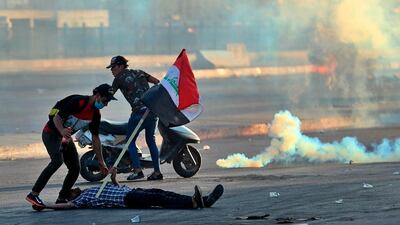A political earthquake is shaking Iraq as massive demonstrations have awakened dormant societal fissures, broadly pitting the Shiite underclass against an alliance of coreligionist clerics, militia chiefs and businessmen loyal to Iran.
Almost 100 people have been killed since the beginning of this month in demonstrations in central and southern Iraq demanding the wholesale removal of the political class. But it is the Shiite ruling elite, and Iran, who stand to lose the most.
The elites are no longer able to blame the US or, since the recapture of Mosul in 2017, Sunni militants for Iraq’s ills. They have failed to honour economic promises to Shiites multitudes they had charged along sectarian lines to garner votes for clerically endorsed lists.
While Sunnis and members of what is left of the Iraqi middle class have joined the protest movement, its epicentre is the vast, impoverished expanse of southern Iraq, and the Shiite slums of Baghdad.
A Shiite political ascendancy followed the 2003 US-led invasion that toppled Saddam Hussein, with former exiles initially at the top. The Shiites constitute an estimated two-third of Iraq’s population of 40 million.
A new class of Shiite politicians and militias later took over. They garnered support from Iran and an emerging class of merchants and war profiteers in Baghdad and the holy city of Najaf, where clerics enjoyed a brief independence after 2003 before coming under pressure to tip toe to Iran.
Pro-Iranian media across the Middle East largely dismissed the protests as a conspiracy and an Iranian clerical official sought to give credence to such theories.
Abbas Al Kabi, a member of Iran’s Council of Experts, told Fares news agency that “malignant Britain and Saudi Arabia have been planning for more than a year to sow strife and riots” in Iraq. The aim of the two countries, he said, is to neutralise Iraq’s Shiite militia, which he termed “resistance forces”.
Shiite militias reportedly joined security forces in firing at the demonstrators, although Prime Minister Adel Abdel Mehdi said the authorities were careful to observe “international standards” in dealing with the street challenge.
Mr Abdel Mahdi started his political career as a Maoist before turning Islamist and allying with the Hakims, a political and clerical family from Najaf with traditional religious links to Iran.
The links turned into an alliance during Hussein’s rule after the late Ayatollah Mohammad Baqer Hakim formed an armed opposition group in Tehran, the Supreme Council for the Islamic Revolution in Iraq, which metamorphosed into Iran’s main militia tool in Iraq.
In a sign of fissures between the Shiites in the seat of power and their supposed constituency, many of the early killings of demonstrators occurred in Nasiriyah in southern Iraq, Mr Abdel Mahdi’s home town.
The south accounts for most of Iraq's oil production, which has done little to lift the region out of poverty. Many of its inhabitants have moved to the edge of Baghdad, where they have become known as Shrougies, meaning
easterners — a derogatory term designed to paint them as outcasts.
The south was also a reservoir for troops during Hussein’s eight-year war with Iran, which ended in 1988. A legacy of anti-Iranian sentiment persists across the country, despite Iran’s attempts to install clerics and local officials loyal to Tehran.
Along with slogans demanding and end of corruption, protesters have been shouting “no to Iranian tutelage” and “Iraq is free. Iran get out”.
The demonstrators have been spontaneous, with no political group behind them. Some activists are starting to emerge, although one activist and his wife were reportedly killed in the city of Basra on Thursday when gunmen stormed their house.
An independent cleric, who did not want to be identified for safety reasons, plugged into the street movement in Baghdad said Iran “is losing Iraq’s Shiites” by de facto backing the crackdown.
“Instead of helping build Iraq, the Iranians have supported the most corrupt of Iraqi politicians and used Iraqis as cannon fodder for their militia wars,” the cleric said by phone from Baghdad.
“Iran aims to break as many skulls as necessary to maintain control.”
Iran’s entrenchment in Iraq in the last decade had served as a springboard to its intervention in Syria, which was carried out significantly through the contribution of Shiite militia from Iraq and the government in Baghdad.
Iran wants to ensure the Baghdad government remains friendly to maintain its so called “resistance axis”, comprising of Iraq, Syria and Lebanon, and to counter US pressure. Washington reimposed sanctions on Tehran after pulling out of the 2015 nuclear deal last year.
In treating Iraq as a geopolitical tool, however, Iran has undermined the political order in which it had greatly invested.


